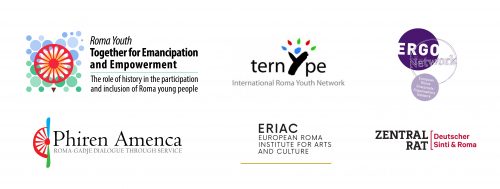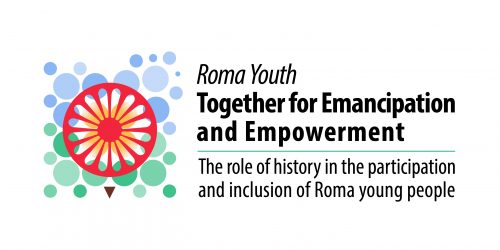CALL FOR PARTICIPANTS
Roma Youth: Together for
Emancipation and Empowerment
The role of history in the participation and inclusion
of Roma young people
In the framework of the programme of the German Presidency
of the Committee of Ministers of the Council of Europe
Online conference and public event
7-8-9 April 2021
on the occasion of International Roma Day
and the 50th anniversary of the First World Romani Congress
Roma history, remembrance and youth participation
It is widely acknowledged that remembrance of gross human rights violations, such as the
Holocaust, is more than just learning about the past: it is learning from the past so that it is
not repeated. This prevention function is coupled with restoring a sense of dignity and justice
to the victims and to their families and communities.
The Holocaust of Roma refers to the extermination by the Nazi regime and its allies during
the Second World War of at least 500 000 Roma, Sinti, Yenish and members of other
communities labelled as “Zigeuner” (Gypsies). The importance of learning about the Roma
Holocaust has been recognised by the Committee of Ministers of the Council of Europe in a
recommendation on the inclusion of the history of Roma and/or Travellers in school curricula
and teaching materials:
Teaching about the Holocaust perpetrated by the Nazi regime and its allies as well as
other acts committed against Roma and Travellers across Europe could be an effective
tool in combating all forms of hatred, discrimination and prejudice, as well as
radicalisation, Holocaust denial and revisionism (…);
The work on remembrance of the Roma Genocide has been actively pursued by Roma youth
organisations and movements, notably through activities commemorating 2 August as
European Roma Holocaust Memorial Day. The personal need to understand one’s past and
history is understandably more important in the case of a community, the Roma, whose history
is largely ignored and generally side-lined by mainstream history. Remembrance and
knowledge about the Roma Genocide is becoming even more important in current times of
increasing history distortion and Holocaust denial as well as rising antisemitism and
antigypsyism. The promotion of the teaching of Roma and Traveller history and the Roma
Holocaust is one of the priorities of the current Council of Europe Strategic Action Plan for
Roma and Traveller Inclusion (2020-2025).
That Roma young people acknowledge the importance of learning about their history in order
to grow up confidently as young Europeans is evidence that identities do not have to be
constructed in opposition to other identities or in self-defence. A community that is aware of
its history and culture is more likely to look at the future with confidence. The Council of
Europe supported young people to learn about the Roma Holocaust namely through the
former Roma Youth Action Plan, and the former Thematic Action Plan for the Inclusion of
Roma and Travellers (2016-2019). Fostering Roma identity through various strategies and
actions has been central to the work of the Council of Europe with Roma youth. Mainstreaming
the history of the Roma people has been one of the approaches.
Roma young people themselves consistently express their concerns and demands more
vigorously and thoroughly. They have moved toward establishing more national and international
organisations and networks. They also took leadership to connect with other campaigns,
for example, commendably steering the Roma movement to participate in the European campaign
on recognising and remembering the Roma victims of the Holocaust and the Roma resistance.
The Council of Europe has recognised the role of remembrance and memorialisation as a
moral right that also helps young people to embrace and respect their Roma, national, and
European identities equally. It has engaged in creating educational materials on the right to
remember and in organising commemoration events to develop a stronger sense of a collective
Roma identity around the memory of the Holocaust. The Council of Europe promotes the
integration of Roma into society and knowledge about the history of the Roma Genocide is an
integral part of this process. The most visible, participatory, youth-led initiative on
remembrance so far has been Dikh He Na Bistar. The campaign was initiated by TernYpe and
included the Council of Europe’s work on the Remembrance of the Roma Holocaust such as:
“Right to Remember” manual, the data base on the Roma and Sinti Holocaust, the fact
sheets on the Roma Holocaust4, as well as online tools and gatherings of thousands of Roma
(and non-Roma) youths from all over Europe and beyond to mark August 2 (Roma Holocaust
Remembrance Day) and May 16 (The Roma Resistance Day).
Yet, some European countries have yet to recognise and commemorate the Roma victims of
the Holocaust.
Some still believe that we should not talk about the past, but they don’t understand
that this was our history, it is part of who we are, and we need to know it.
Elvis Beriša, Montenegrin Roma activist
The policy of the youth sector of the Council of Europe aims at enabling young people across
Europe to actively uphold, defend, promote and benefit from the Council of Europe’s core
values. Combating discrimination, fostering promoting social inclusion and participation must
be a central task to any youth policy. This obviously includes young people from Roma and
Travellers communities. Partnerships with Roma youth organisations and networks play a
central role in this work.
A recent study on Roma youth participation concludes that
in Europe, policies have yet to mention and address systematically and continuously
the needs of Roma youth. To date, targeted policies, standards, and programmes
specific for and with Roma youth have almost never been developed and implemented
at the local, national, and European levels. National and European institutions have
avoided or neglected recognising and including the specific history, needs, and
challenges of Roma youth in mainstream policies and measures. This neutral, “one fits
all” approach in policies and recommendations targeting a very diverse spectrum of
European young people has ignored and denied the reality of racism and historical and
structural inequalities faced by Roma youth and other racialised young peoples.
To ensure inclusive policies, Roma young people must be included in youth and Roma policies
and programmes in all stages, from design to evaluation. Moreover, to be effective and
trustworthy, policies, including youth policy ought to incorporate anti-racist and social
inclusion measures.
The Joint Council on Youth intends to further support the participation and inclusion of Roma
young people in policies and programmes. The Covid-19 has impacted the effective policies
of meeting and working together.
This conference partly remediates this by associating a wider audience of Roma and nonRoma
stakeholders in the youth and human rights fields to the task of addressing persisting
factors discrimination and fostering the participation of Roma and Traveller young people
based on equality and dignity.
The conference is organised by the Youth Department and the Roma and Travellers Team of
the Council of Europe in the framework of the German Presidency of the Committee of
Ministers of the Council of Europe. It is prepared and implemented in co-operation with the
European Roma Institute for Arts and Culture (ERIAC) and in close association with Ternype,
the European Roma Grass Roots Organisations Network, Phiren Amenca and the Central
Council of German Sinti and Roma.
Aims and objectives of the event
The conference aims at strengthening the knowledge of Roma and Traveller history, culture
and identity as a factor enhancing social inclusion and participation of Roma and Traveller
young people. Its specific objectives are:
• To support cooperation among Roma and non-Roma youth leaders by meeting,
interacting and learning about the role of Roma history and culture in shaping the
identities and perceptions of Roma youth in Europe today
• To support the dissemination and usage of Council of Europe standards and
educational resources, in particular the Recommendation of the Committee of Ministers
to member States on the inclusion of the history of Roma and/or Travellers in school
curricula and teaching materials, the handbook “Right to Remember” and the role of
the European Roma Institute for Arts and Culture therein
• To motivate participants and their organisations in their work as multipliers on
education about Roma and Traveller history, culture and identity as well as Roma
Holocaust Remembrance
• To reflect and about and propose action regarding expressions of antigypsyism today
such as online hate speech, Holocaust denial and mis-representations of history
• To collect and disseminate experiences and expectations about promoting the
participation and inclusion of Roma and Traveller young people
• To celebrate Roma cultural diversity and associate young people and youth
organisations to the celebrations of the International Roma Day (8 April) and the 50th
anniversary of the First World Romani Congress, held in 1971 in Orpington, Kent,
United Kingdom.
Methodology and Programme
The conference will be organised as an online event over 3 days. The programme, methods
and technology will be organised so as to favour mutual learning, interaction and dialogue
among participants – notably in small discussion groups and workshops.
As a way of sharing experiences and connecting young people all across Europe, participants
and partners will be supported to prepare and share an action that they organise or offer to
celebrate International Roma Day on 8 April and the 50th anniversary of the First World Romani
Congress and the awakening of a “Romani Movement” to promote Roma history, culture and
identity, and to fight for human rights, justice, equality and better representation at political
level. This will be broadcast in connection with a symbolic event at the Council of Europe.
Online/virtual visits to museums or places of remembrance of the Roma Holocaust and
expressions of Roma culture, arts and identity will also be proposed in addition to the formal
programme of the conference.
The programme contents will be structured on three main issues:
7 April: Roma history and Roma Holocaust Remembrance
8 April: Celebrating Roma history, arts, culture and identity as well as the 50th
anniversary of the emergence of a Romani human rights movement
9 April: Furthering youth action, mobilisation, inclusion and participation
Each thematic will feature key inputs, sharing of experiences and workshops facilitated by
partner organisations, including Roma youth organisations. Specific links will be made with
projects of the Youth Department and of the Roma and Travellers Team that intersect with
youth participation, history, and remembrance.
The conference will close with the presentation of conclusions and proposals for furthering
work on Roma history with young people and ways to expand Roma youth participation based
on double mainstreaming.
Participants
The conference is designed for Roma and non-Roma young people, youth leaders and
representatives of organisations and networks working with Roma communities from all across
Europe who are also:
• Motivated to share experiences and engage in dialogue and cooperation with other
participants
• Active within a Roma organisation or a (Roma) youth organisation
• Able to work/communicate in English, French or Romani
• Able to connect to the Internet for the time of the conference.
Priority will be given to participants under 30 years of age. The Council of Europe welcomes
applications from all candidates who fulfil the profile above, irrespective of gender, disability,
marital or parental status, racial, ethnic or social origin, colour, religion, belief or sexual
orientation.
How to participate
Participation in the whole event is subject to registration.
The deadline was extended to 31 March.
https://youthapplications.coe.int/
Please register until 31 March 2021 23:59 PM (CET)
Participants attending at least 80% of the conference will receive a certificate of attendance.
More information: eyc.programme@coe.int
Call for Participants CN Conference Roma youth April 2021 (003)
Call for participants Terne Roma April 2021
Appel à participants Conference Jeunes Roms avril 2021 (003)
Program of the Online Conference


